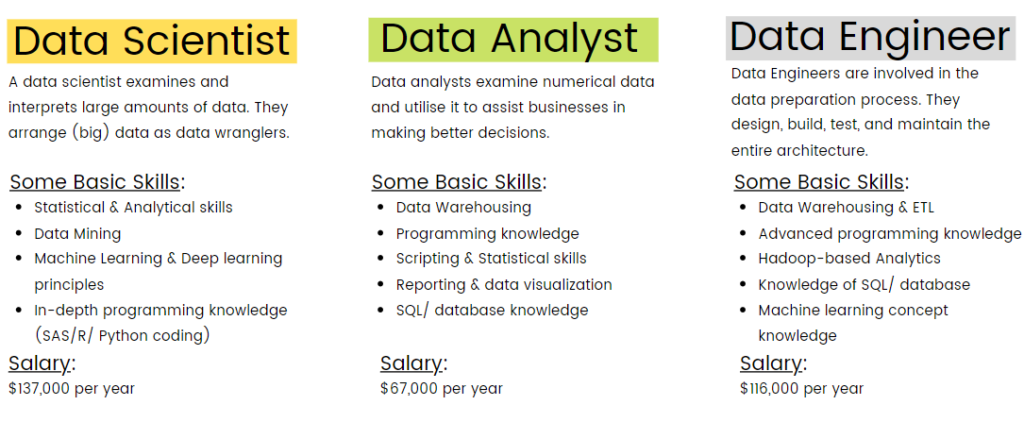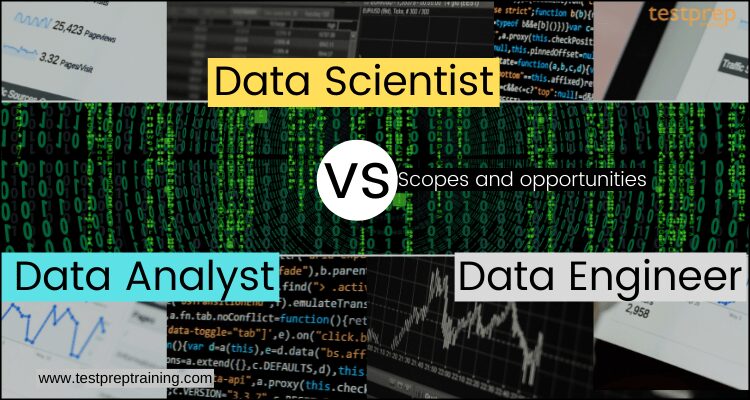From solving complicated problems to introducing new ideas, those working in the data area face a unique set of challenges. Data, as we all know, is the driving force behind today’s world. From generating ideas to improving decision-making processes, data has the potential to unlock the success of any industry. It has radically changed the world as we know it, to the point that it’s impossible to function without the information obtained from data in every discipline. Furthermore, as data’s significance has expanded, a variety of data-related career responsibilities and possibilities have sprung up all over the world. Data Scientist, Data Engineer, and Data Analyst are three of the most in-demand job roles in businesses.
According to a survey, these roles will account for a large number of jobs in the next years. Because of the tremendous rate of data generation and the growing need to make sense of it, they are extremely profitable. However, due to the increased demand for these positions, many people just starting their careers in data have a blurry understanding of the abilities necessary for each position. As a result, it’s critical that you know the distinctions between the three most crucial data jobs. So, in this article, we’ll look at each of these interesting data careers’ job descriptions, organizational positions, necessary skill sets, and income expectations.
Let’s begin with the data scientist role!
Who is a Data Scientist?
A data scientist is someone who examines and interprets large amounts of digital data. While there are multiple paths to becoming a data scientist, the most straightforward is to get sufficient experience and master the necessary data scientist abilities. Advanced statistical analyses, a thorough knowledge of machine learning, data conditioning, and other talents are among them.
For gaining business insights, they use advanced data techniques such as clustering, neural networks, decision trees, and others. You will be the most senior member of a team in this position, and you should have extensive knowledge in machine learning, statistics, and data management. After receiving feedback from Data Analysts and Data Engineers, you will be responsible for creating actionable business insights. You should be able to perform the functions of both a data analyst and a data engineer. In the case of a data scientist, however, the skill sets must be more in-depth and comprehensive.
Necessary Skills for the role of a Data Scientist:
To be well-versed in the role of a data scientist,
- You have to master programming languages such as Java, Python, SQL, R, and SAS.
- You should be familiar with Big Data frameworks such as Hadoop, Spark, and Pig. Additionally, a solid grasp of the fundamentals of technologies like Deep learning, Machine learning, and others can help you advance in this position.
- After that, you’ll need an analytical mind and business savvy, as well as good math abilities (e.g. statistics, algebra)
- Excellent communication and presenting abilities, as well as problem-solving ability.
- Lastly, a bachelor’s degree or higher in computer science, engineering, or a related discipline is required; a master’s degree in data science or another quantitative field is recommended.
Furthermore, you can take the certification for mastering your skills in the same role. The top certifications for the data scientist role include:
- Microsoft Certified Azure Data Scientist Associate
- IBM Data Science Professional Certification
- SAS Certified Data Scientist
- Google Professional Data Engineer Certification
- Amazon AWS Data Analytics Certification
Responsibilities of Data Scientist:
As a data scientist, you’ll be responsible for the following:
- To prepare unstructured data for practical use, manage, mine, and filter it.
- Creating models that can work with large amounts of data.
- Analyzing Big Data in order to comprehend and analyze it.
- Taking command of the data team and assisting them in achieving their objectives.
- Delivering results that have a direct impact on the bottom line.
- Identifying and automating valuable data sources and collecting procedures.
- Preparing organized and unstructured data for analysis Analyze vast volumes of data to find trends and patterns
- Creating machine-learning algorithms and prediction models.
- Ensembling modeling for combining models.
- Data visualization methods for presenting the information.
- Proposing business-related solutions and strategies.
- Collaborating with product development and engineering teams.
Scope of a Data Scientist:
Becoming a data scientist will not only help you master your skills and knowledge but it will provide you a chance to become part of top companies that have a huge demand for this role. This include:
- Citibank
- Intel
- Amazon
- Schneider
- S&P Global
- Moody’s
Salary Expectations:
You can make up to $137,000 per year as a data scientist.
Who is a Data Analyst?
In a data analytics department, a Data Analyst is an entry-level position. In this role, you must be skilled at converting numerical data into a format that everyone in the business can understand. Furthermore, you must be proficient in a variety of areas, including programming languages such as Python, tools such as Excel, data management foundations, reporting, and modeling. With enough experience under your belt, you may go from being a data analyst to being a data engineer or a data scientist.
Furthermore, the majority of entry-level professionals who want to work in the data industry start out as data analysts. It’s as easy as it gets to qualify for this position. All you need is a bachelor’s degree and a decent understanding of statistics. Strong technical abilities are an advantage and might help you stand out from the crowd. Aside from that, firms want you to have a solid understanding of data processing, modeling, and reporting methodologies, as well as a deep grasp of the business.
Necessary Skills for the role of Data Analyst:
To be well-versed in the role of a data analyst,
- SAS Miner, Microsoft Excel, SPSS, and SSAS are just a few of the tools you’ll need to know. It would be advantageous if you had a basic understanding of Python, SQL, R, SAS, and JavaScript.
- You must have good analytical abilities, including the ability to gather, organize, analyze, and distribute large volumes of data with precision and attention to detail.
- Inquiries, report writing, and presenting conclusions need a high level of comprehension.
- Lastly, a bachelor’s degree in math, economics, computer science, information management, or statistics is required.
Talking about the certification, you can advance your skills in the same role using the top certifications for the data analyst which include:
- Microsoft Certified Azure Data Scientist Associate
- Amazon AWS Data Analytics Certification
- Microsoft Certified: Data Analyst Associate
- Certified Analytics Professional(CAP)
- IBM Data Science Professional Certificate
Responsibilities of Data Analyst:
As a data analyst, you’ll be responsible for a variety of tasks, including:
- Gathering information from a database with the help of a query and enabling data processing and summarizing results
- Using basic algorithms such as logistic regression, linear regression, and so on
- Possessing and displaying deep expertise in data munging, data visualization, exploratory data analysis, and statistics
- Interpreting data, examining the outputs using statistical techniques, and providing ongoing reports
- Creating and implementing databases, data collection systems, data analytics, and other strategies for optimizing statistical efficiency and quality
- Obtaining data from primary or secondary data sources and keeping an eye on databases/data systems maintenance
- Discovering, examining, and interpreting trends or patterns in complex data sets
- Detecting and solving code flaws, filtering, and cleaning data by evaluating computer reports, printouts, and performance indicators.
- Working with management for determining the most important business and information requirements.
- Finding and specifying new possibilities for process improvement.
Scope of a Data Analyst:
Becoming a data analyst will help you master your skills and knowledge to get into entry-level roles at top companies that have a huge demand for this role.
- Infosys
- 24/7
- Oracle
- Southwest
- Walmart
- VISA
- Capital One
- Credit Suisse
Salary Expectations:
Data analysts can expect to earn an average of $67,000 per year, which is impressive given that this is an entry-level position.
Who is a Data Engineer?
A Data Engineer either has a master’s degree in a data-related discipline or has worked as a Data Analyst for a long time. A Data Engineer must have a solid technical background and be capable of creating and integrating APIs. They should also be familiar with data pipelines and performance optimization.
However, between data analysts and data scientists, data engineers serve as a bridge. You will be responsible for the matching and preparation of data for operational or analytical purposes as a data engineer. For this position, you will need a lot of expertise with data architecture building, development, and maintenance. Typically, you will be working with Big Data, compiling reports, and sending it to data scientists for study in this capacity.
Necessary Skills for the role of Data Engineer:
- You’ll need a solid grasp of programming languages like Java, SQL, SAS, Python, and others.
- Secondly, you should be comfortable with frameworks like Hadoop, MapReduce, Pig, Hive, Apache Spark, NoSQL, and Data Streaming, to name a few.
- Then, excellent working knowledge of SQL database design.
- You need to have excellent mathematical and analytical abilities.
- Lastly, a bachelor’s degree in computer science, information technology, or a related discipline is required; a master’s degree is preferred.
Furthermore, you can take the certification for mastering your skills in the same role. The top certifications for the data engineer role include:
- Google Professional Data Engineer Certification
- Microsoft Certified: Azure Data Engineer Associate
- SAS Certified Big Data Professional Using SAS9
- Amazon AWS Data Analytics Certification
- Cloudera Certified Professional (CCP) Data Engineer
Responsibilities of Data Engineer:
Your responsibilities in this role are:
- Using data Mining for obtaining insights from data.
- Converting erroneous data into a useable form for data analysis.
- Writing queries on data as well as maintaining the data design and architecture.
- Creating large data warehouses with the help of extra transform load (ETL).
- Examining and organizing raw data.
- Creating data systems and pipelines as well as evaluating business needs and objectives.
- Interpreting trends and patterns as well as conducting complex data analysis and reporting on results.
- Preparing data for prescriptive and predictive modeling.
- Creating algorithms and prototypes.
- Integrating raw information from different sources and finding ways for enhancing data quality and reliability.
- Identifying opportunities for data acquisition.
- Developing analytical tools and programs.
- Connecting with data scientists and architects on several projects.
Scope of a Data Engineer:
Becoming a data engineer will not only help you advance your skills and knowledge to get into entry-level roles at top companies that have a huge demand for this role.
- Apple
- Cognizant
- Spotify
- Microsoft
- AT&T
- CISCO
- FLOWCAST
- Intel
- Amazon.
Salary Expectations:
Data Engineers can expect to earn an average of $116,000 per year.
Summarizing:

Final Words
Depending on which data job path you select, whether it’s Data Scientist, Data Engineer, or Data Analyst, data roles are very profitable and will only benefit in the future as a result of the impact of emerging technologies like AI and Machine Learning. However, before pursuing a career in this field, keep in mind that these positions are not interchangeable and need different skill sets. You must learn to distinguish between them since the sector is already overloaded with general practitioners and is now experiencing a shortage of experts.
You may also take certifications to improve your abilities and open doors to new opportunities if you want to get a head start on these careers. Furthermore, whether you already work as a data engineer or data analyst, the Data Science Certifications might help you advance your career. Additionally, obtain hands-on experience with industry projects while validating your profile with a globally recognized certificate.




